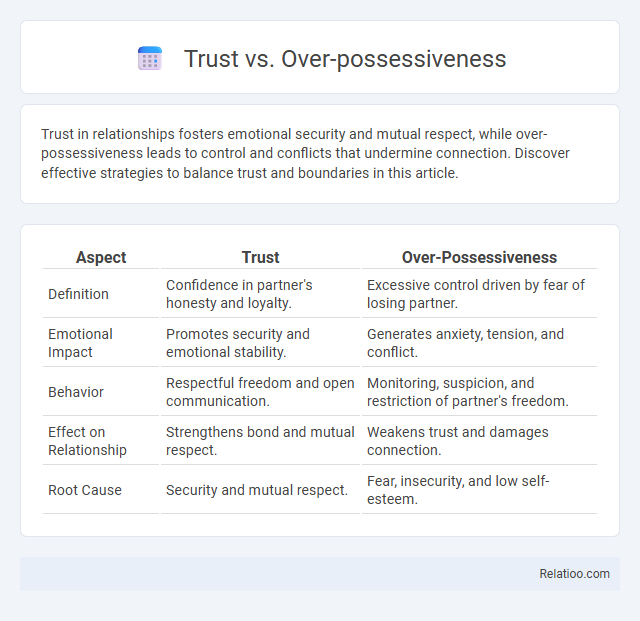Trust in relationships fosters emotional security and mutual respect, while over-possessiveness leads to control and conflicts that undermine connection. Discover effective strategies to balance trust and boundaries in this article.
Table of Comparison
| Aspect | Trust | Over-Possessiveness |
|---|---|---|
| Definition | Confidence in partner's honesty and loyalty. | Excessive control driven by fear of losing partner. |
| Emotional Impact | Promotes security and emotional stability. | Generates anxiety, tension, and conflict. |
| Behavior | Respectful freedom and open communication. | Monitoring, suspicion, and restriction of partner's freedom. |
| Effect on Relationship | Strengthens bond and mutual respect. | Weakens trust and damages connection. |
| Root Cause | Security and mutual respect. | Fear, insecurity, and low self-esteem. |
Understanding the Foundations of Trust
Trust is built on consistent honesty, reliability, and open communication, serving as the foundation for healthy relationships. Over-possessiveness often stems from insecurity and fear of loss, which undermines trust and creates tension. Understanding the psychological roots and emphasizing mutual respect can help transform possessive tendencies into stronger, more genuine trust.
Defining Over-possessiveness in Relationships
Over-possessiveness in relationships is characterized by excessive control and jealousy that undermines trust and personal boundaries. It often manifests as constant monitoring, restricting a partner's interactions, and demanding undue reassurance, which erodes emotional security. Establishing healthy trust requires addressing over-possessiveness to foster mutual respect and autonomy within the partnership.
Key Differences: Trust vs Over-possessiveness
Trust fosters a healthy relationship by promoting confidence and emotional security, while over-possessiveness stems from insecurity and leads to controlling behavior. Trust encourages independence and mutual respect, whereas over-possessiveness restricts freedom and creates tension. Key differences lie in trust's foundation of faith versus over-possessiveness' roots in fear and anxiety.
Psychological Roots of Trust and Possessiveness
Trust stems from secure attachment and positive early relationships, fostering confidence in others and emotional stability. Over-possessiveness often arises from insecurity, fear of abandonment, and low self-esteem, triggering control and anxiety in relationships. Your psychological well-being depends on balancing trust and possessiveness by addressing underlying fears and building self-trust.
Signs Your Relationship Lacks Trust
A relationship lacking trust often exhibits signs such as constant jealousy, frequent accusations, and excessive checking of a partner's whereabouts or communications. Over-possessiveness manifests through controlling behaviors, restricting social interactions, and demands for constant reassurance, which erode emotional security. Identifying these patterns early can help address underlying trust issues and promote healthier relationship dynamics.
Warning Signals of Over-possessiveness
Warning signals of over-possessiveness include constant monitoring of Your partner's activities, restricting their social interactions, and displaying excessive jealousy without cause. These behaviors can erode trust and create an unhealthy dynamic that stifles personal freedom and emotional well-being. Recognizing these signs early helps maintain balanced relationships based on mutual respect and trust.
The Impact of Trust on Relationship Growth
Trust acts as the foundation for healthy relationship growth, fostering emotional security and open communication. Over-possessiveness undermines trust by creating feelings of restriction and insecurity, leading to conflict and emotional distance. Your ability to build and maintain trust directly influences the resilience and depth of your relationship.
Negative Consequences of Being Over-possessive
Over-possessiveness often leads to mistrust, creating a toxic environment that strains relationships and diminishes emotional security. Your constant monitoring and control can push loved ones away, fostering resentment and damaging mutual respect. This negative dynamic undermines healthy communication, making it difficult to build genuine trust and intimacy.
Strategies for Building Trust and Reducing Possessiveness
Establishing open communication and consistent honesty fosters trust while reducing feelings of insecurity that fuel over-possessiveness. Setting clear boundaries and encouraging individual independence supports emotional autonomy, which diminishes control-driven behaviors. Practicing empathy and active listening helps partners understand fears and concerns, creating a foundation for mutual respect and decreased possessiveness.
Nurturing Healthy, Trust-Based Relationships
Nurturing healthy, trust-based relationships requires balancing trust with boundaries to prevent over-possessiveness, which can lead to control issues and emotional distress. Establishing open communication and mutual respect fosters security and freedom, allowing both partners to grow individually and together. Prioritizing emotional honesty and recognizing the signs of over-possessiveness helps maintain a supportive and stable connection.

Infographic: Trust vs Over-possessiveness
 relatioo.com
relatioo.com